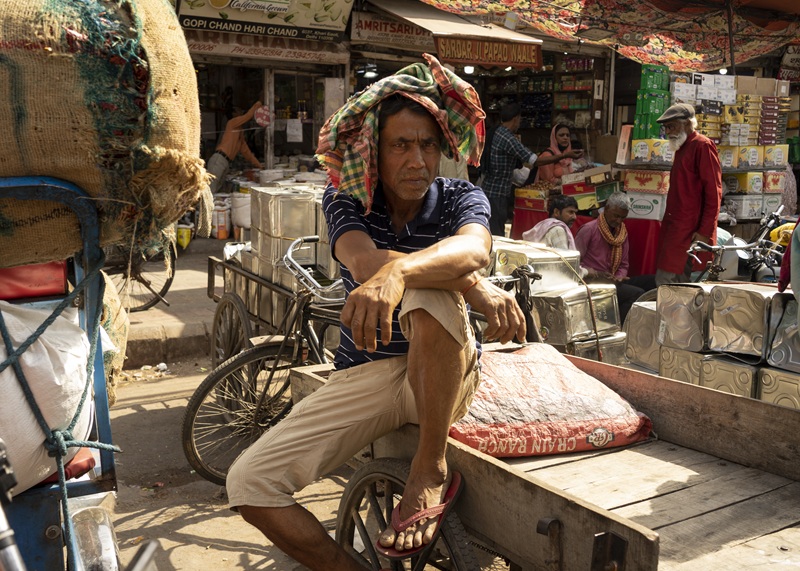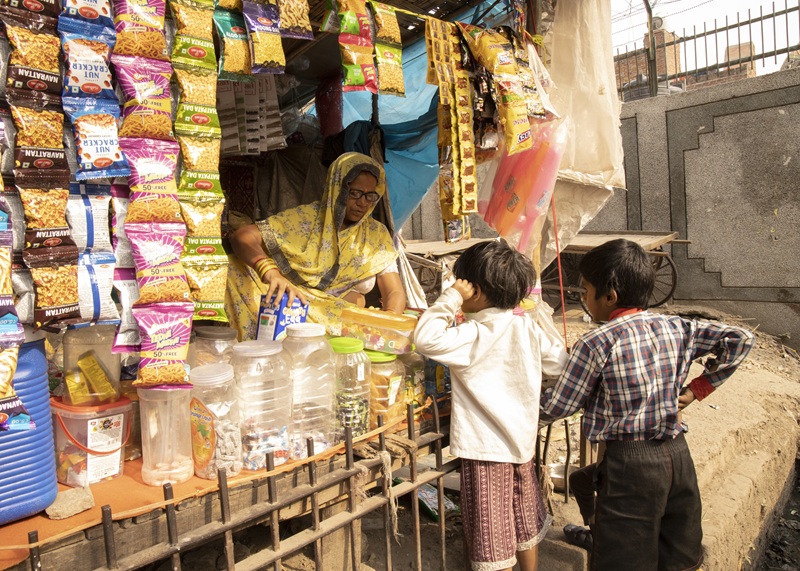More frequent and intense heatwaves, driven by climate change, are harming the health and wealth of sellers at the daily street market in the shadow of Delhi’s iconic Red Fort, a study has found.
Researchers from Greenpeace India and the newly formed Workers’ Collective for Climate Justice South Asia interviewed ten market sellers from the huge Lal Qila (Red Fort) Market, as well as activists and social workers supporting this community.
They found that men and women selling products like shoes, clothes and dried fruits to the local community are standing for hours in the sun and suffering headaches, dizziness and fainting spells.
“By 11am, the sun feels like it’s piercing through the skin,” said one unnamed trader. “By evening, our feet are swollen, and we can’t even feel our toes properly,” said another.
On International Workers Day in Delhi on Thursday, groups representing hundreds of thousands of workers launched the “Workers’ Collective for Climate Justice – South Asia” and signed a petition calling for governments to tax fossil fuel companies to fund climate action.
India heats up
In each of the last three years, India has been hit by summer heatwaves which scientists say have been made much more likely and much hotter by human-induced climate change.
Although far from the typical June peak, this year temperatures are already in the high 30s C (around 100F), harming the capital city’s several hundred thousand market sellers and other informal workers like rickshaw drivers, waste pickers and domestic workers.
Workers are trying to adapt to the changing climate but shade-providing tarpaulins are torn down by authorities and a lack of accessible drinking and toilet facilities means keeping hydrated is a challenge.
Sandeep Verma is an advisory board member for Youth Organisation for Democratic Development and Help in Action, an organisation that campaigns on behalf of market vendors in Delhi. He told Climate Home that using public toilets in Lal Qila costs at least 10 rupees ($0.11) each time.

Because of these “very high charges”, he said, vendors avoid drinking. While men find it easier to urinate publicly, it’s a “very difficult situation” for women, he added. The Greenpeace report finds urinary tract infections and kidney stones are common consequences.
Despite the health impacts, many market traders reported lacking the time, documentation or confidence to access public health systems.
“With clinics often hostile or overcrowded, workers self-medicate, ignore symptoms, or work through illness until their bodies break down. Climate crisis, in this context, is not just ecological, it is deeply biological, marked by silent inflammation, exhaustion, and untreated ailments,” the report found.
Heatwaves have financial costs too. A separate 2023 study in Delhi found that for every degree Celsius increase in the temperature, informal workers lose around a fifth of their net earnings.
On May Day, workers are calling – and climate activists must answer
Verma told Climate Home that Delhi’s residents avoid markets in the extreme heat, reducing customer footfall and vendor earnings. The heat also spoils food and flower products, as vendors lack refrigeration.
Tarpaulins torn down
Traders are trying to adapt to heatwaves by wearing cooler cotton clothes, wearing headscarves, hats and wet clothes, and consuming glucose sugar sachets.
They also use tarpaulin sheets, umbrellas and plastic covers for shade or set up their stalls under trees or near buildings. But municipal authorities often remove this shade, the report says, as these makeshift structures are considered ‘encroachments’.
“They don’t allow us to put up cloth covers, even when everything’s melting,” said one street trader surveyed by researchers.

Verma said that municipal authorities and police officers will seize all a trader’s goods, putting them temporarily out of business, and that the procedure to get goods back takes 15-20 days.
He added that, since the 2014 Street Vendor Act, such seizures are unlawful unless notice has been served. His union is filing legal cases against the practice but this has proved time-consuming and so far unsuccessful, he said.
The report’s authors say that vendors should be able to use umbrellas, tarpaulins and mobile carts without fear of confiscation and that community cooling centres and designated vending zones with heat-resilient roofs, ventilation, drinking water and sanitation should be set up.
Canada votes to keep Carney as leader, over anti-climate Conservatives
The research found that street vendors are getting together to share information and lobby the authorities. They are represented by the National Hawker Federation and Janpahal, who offer legal aid and campaign for them while the Self-Employed Women’s Association supports female vendors.
“These support groups are critical not just during episodes of state-led eviction drives or crackdowns but also during periods of distress” like the COVID-19 lockdown or heatwaves, the report said.
Many market traders have been able to secure identity cards and vending certifications under the 2014 street vendors’ law, giving them more rights. Verma is calling for the provisions of this law to be enforced in full.

